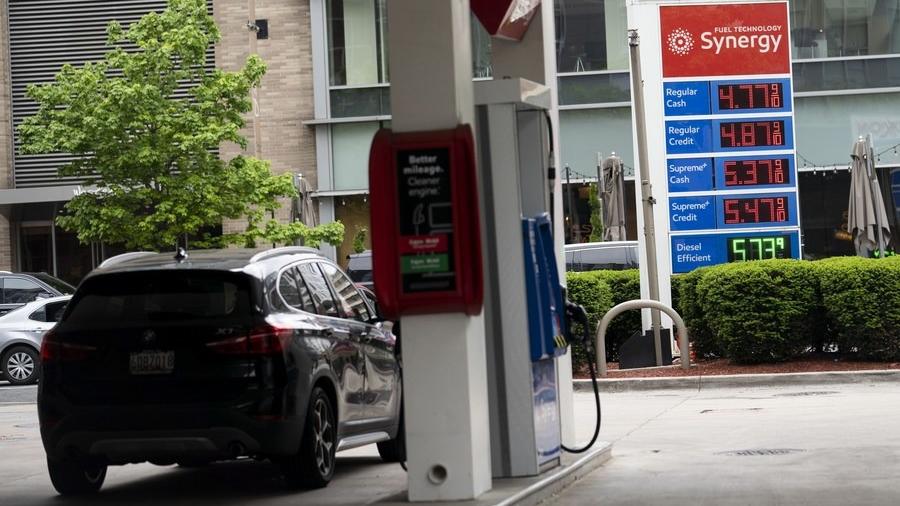 Gas prices are displayed at a gas station in Washington, DC, on May 11, 2022. (PHOTO / XINHUA)
Gas prices are displayed at a gas station in Washington, DC, on May 11, 2022. (PHOTO / XINHUA)
As the need for energy grows, ensuring its global security will require oil and gas to remain a significant part of the oil-producing countries’ energy mix, say experts.
Sultan Al Jaber, the United Arab Emirates special envoy for climate change and minister of industry and advanced technology, said that his country was seeing record growth in renewables.
But while wind and solar accounted for most new power-generating capacity last year, he said, this still only comprises 4 percent of today’s energy mix.
“A successful energy transition must progress economic and climate action in tandem. As part of this, we know we must do more now to reduce the impact of oil and gas on the climate,” he said.
“Producers, governments, and the private sector must work together to make sure that each new unit of output is less carbon-intensive than the last,” said Al Jaber.
In its monthly oil market report published on Sept 13, the Organization of the Petroleum Exporting Countries, or OPEC reported that world oil demand growth in 2022 remained unchanged from the previous month’s assessment “at a healthy level of 3.1 million barrels per day”.
The report also said that oil demand is forecast to remain driven by global economic growth, especially by the recovery in travel and transportation, which is projected to lead to robust overall growth in oil demand of 3.1 million barrels per day in 2022 and 2.7 million in 2023
The report also said that oil demand is forecast to remain driven by global economic growth, especially by the recovery in travel and transportation, which is projected to lead to robust overall growth in oil demand of 3.1 million barrels per day in 2022 and 2.7 million in 2023, surpassing the pre-COVID-19 levels.
“Given their high economic reliance on oil and gas export revenues, oil and gas exporters, including Kuwait, do not exclude oil and gas from their energy transition roadmap,” said Aisha Al-Sarihi, an energy expert and research fellow at the Middle East Institute, National University of Singapore, or MEI-NUS.
Al-Sarihi said oil and gas resources and the revenues gained from their export “are currently irreplaceable” in helping provide for basic needs and cushion the adverse impacts of climate change, including the growing need for cooling, water desalination, and securing food supplies.
She said that oil exporting countries such as the Gulf Arab states have been exploring ways and means that maintain the competitiveness of hydrocarbons in a climate constrained world.
Al-Sarihi also said that to monetize the value of hydrocarbon resources as much as possible, Gulf countries have been advocated for and prioritizing technologies that do not restrict the production and exportation of hydrocarbons. These include carbon capture and storage and the production of hydrogen and green ammonia.
ALSO READ: Efforts on to ensure fuel supply for power plants amid heat wave
Yesar Al-Maleki, an energy expert and Gulf analyst at the Middle East Economic Survey, an energy publication in Cyprus, said that Iraq is largely dependent on oil income, making up 90 percent of the government revenues and “is not expected to change anytime soon”.
Al-Maleki also said that attempts to raise non-oil revenues have not been successful for a plethora of reasons, citing the country’s inability to raise effective taxation, its lack of economic diversification, corruption and a “nascent and uncompetitive private sector”.
“So, oil and gas will continue to be the country's bread earner. But Baghdad has to inject capital into maintaining current capacity and increasing oil production in the future. Something that has been lacking since the 2014 and 2020 shocks,” Al-Maleki said.
Al-Sarihi from MEI-NUS said one of drivers behind developing renewable energy has been the need to keep up with growing domestic oil and gas demands while increasing exports, and to free up fuel needed for downstream economic diversification projects.
On Sept 7, digital news outlet Al Arabiya News reported that the European Union had opened an office in Qatar amid a growing international energy crisis in Europe attributed to the effect the Ukraine-Russia conflict has had on supplies.
EU council president Charles Michel had reportedly arrived from Algeria to Qatar and was quoted as saying the EU wants closer ties on “the energy sector, economic development, and security challenges”.
READ MORE: Solar power climbs toward record high
Al Jaber, the UAE’s special envoy for climate change, said the UAE remains a reliable supplier of some of the world’s least carbon-intensive oil and gas, and that they are working to reduce its intensity by a further 25 percent before the end of the decade.
“We are proud to have the region’s first industrial-scale carbon-capture program, and all the electricity consumed by our national oil company now comes from zero-carbon nuclear and solar power,” said Al Jaber.
“These realities are guiding our approach to the energy transition, which involves continuing to meet global needs today while investing in the new energy systems of tomorrow. From our experience we believe this is the best way forward,” he added.
Contact the writer at jan@chinadailyapac.com
Xinhua contributed to this report


